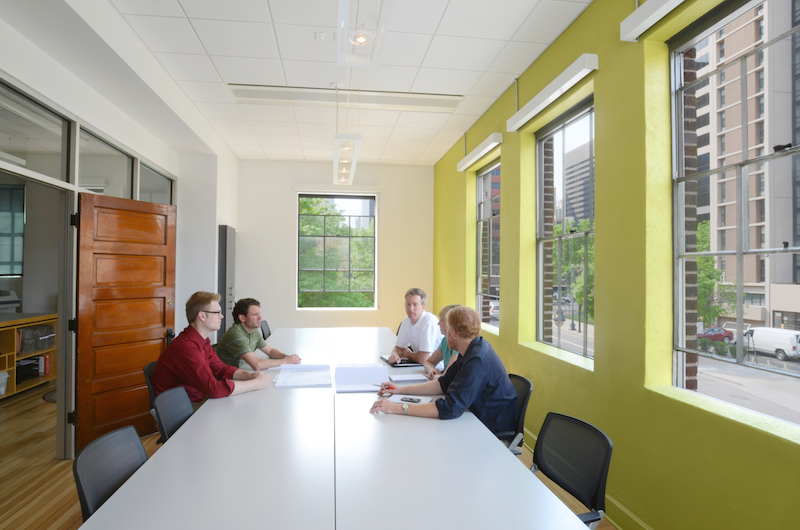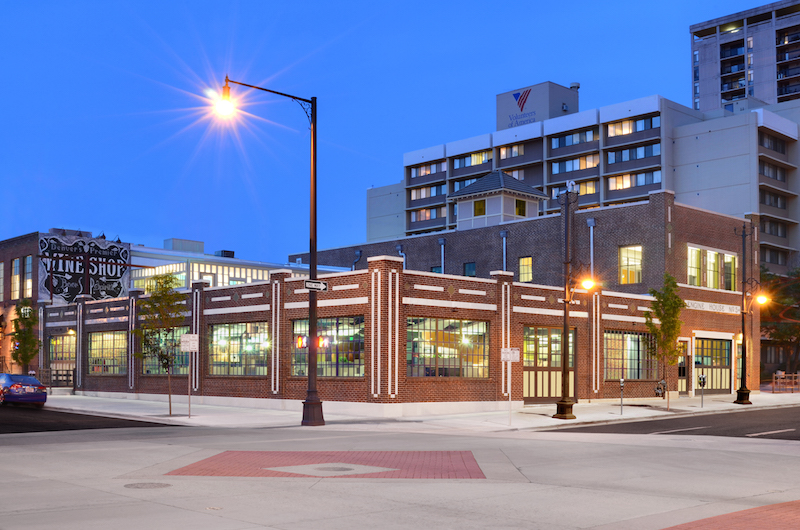The architectural firm Hord Caplan Macht (HCM) recently completed the documentation to verify that its Denver office can meet the standards necessary to be certified under Fitwel, a certification program to support healthier workplaces created by the Centers for Disease Control and Prevention. The Center for Active Design, Fitwel's oerator and third-party certifier, launched in May 2016 and began rolling out to developers and the AEC community last fall.
Working with experts in public health and design, CDC spent five years developing and testing its Fitwel scorecard. The General Services Administration piloted the program in 89 of its buildings.
HCM, which has also provided verification documents for its offices in Alexandria, Va., and Baltimore, is one of five Fitwel Champions that have committed to certifying more than 50 buildings in aggregate. The other Champions include the CDC, which is also Fitwel’s research and evaluation lead; EYP, Integral Group, and Menkes Development.
Perkins+Will was the first company to adopt Fitwel’s standards for all 11 of the firm’s North American offices, which P+W expects will be certified by 2018.
HCM has been in its 13,000-sf Denver office, a former fire station built in the 1920s, since 2010. The office currently has 72 employees. Ara Massey, that office’s Sustainability Design Manager, tells BD+C that the firm measured its three offices against 63 Fitwel strategies in seven health impact categories to establish health and wellness baselines from which it could work toward certification. The evaluation and documentation took about 40 man-hours, she estimates.
The Center for Active Design promotes Fitwel as more “business friendly” than other certification programs. And Massey confirmed that Fitwel gives companies the flexibility to prioritize which standards to align its operations with “without a lot of cost.”
HCM has already successfully integrated many health-promoting features within its offices, including providing staff with fresh fruit and vegetables and locating in areas with high WalkScores.

Hord Caplan Macht's Denver office includes meeting spaces with lots of daylight. Image: Courtesy HCM
However, one thing that surprised Massey was the emphasis that Fitwel’s scorecard places on “lactation rooms” for new Moms returning to the workforce after giving birth. “That was a real eye opener for us,” says Massey.
The next step toward Fitwel certification is the review process, and Massey expects a lot of give and take between her firm and the Center for Active Design to determine how to meet the criteria levels that HCM is willing to adopt.
Now bitten by the wellness bug, HCM also plans to incorporate Fitwel’s wellness standards into its designs for other clients’ projects “as much as possible,” says Massey. “Particularly active design.”
Arup, Structure Tone embrace wellness
While it’s still too early to say definitively, it appears that the wellness movement is slowly catching on with developers and AEC firms. For example, in late December, Arup opened a 16,333-sf office at 60 State Street in Boston, designed by Dyer Brown Architects, which is targeting the Silver level of the International WELL Building Institute’s WELL Building Standard, as well as the Platinum level of LEED v.4.
Structure Tone’s 82,000-sf corporate headquarters in New York City recently became the first project in that metro to receive Well Building Standard certification. It earned a Silver-level designation by installing more efficient mechanicals and lighting that maintains harmony with employees’ circadian rhythms. The office also offers point-of-access water filters, access to healthy foods, and discounts on bike-share and fitness center memberships.
Last year, Structure Tone formed a partnership with Delos, the real estate and tech firm that established the WELL Building Standard, in which Structure Tone agreed to accredit 150 employees through the WELL Accredited Professional program.
Related Stories
Architects | Mar 16, 2023
HKS launches partner diversity program to create a more diverse workforce and partnership network
Design firm HKS has launched a new partner diversity program that will work to build a more diverse AEC ecosystem. The HKS xBE program will give xBE firms (a term encompassing all disadvantaged businesses) and their members “access to opportunities to build relationships, pursue new work, and bolster innovation within the architecture and design professions,” according to HKS.
Sustainability | Mar 16, 2023
Lack of standards for carbon accounting hamper emissions reduction
A lack of universally accepted standards for collecting, managing, and storing greenhouse gas emissions data (i.e., carbon accounting) is holding back carbon reduction efforts, according to an essay published by the Rocky Mountain Institute.
Building Tech | Mar 14, 2023
Reaping the benefits of offsite construction, with ICC's Ryan Colker
Ryan Colker, VP of Innovation at the International Code Council, discusses how municipal regulations and inspections are keeping up with the expansion of off-site manufacturing for commercial construction. Colker speaks with BD+C's John Caulfield.
Student Housing | Mar 13, 2023
University of Oklahoma, Missouri S&T add storm-safe spaces in student housing buildings for tornado protection
More universities are incorporating reinforced rooms in student housing designs to provide an extra layer of protection for students. Storm shelters have been included in recent KWK Architects-designed university projects in the Great Plains where there is a high incidence of tornadoes. Projects include Headington and Dunham Residential Colleges at the University of Oklahoma and the University Commons residential complex at Missouri S&T.
Adaptive Reuse | Mar 5, 2023
Pittsburgh offers funds for office-to-residential conversions
The City of Pittsburgh’s redevelopment agency is accepting applications for funding from developers on projects to convert office buildings into affordable housing. The city’s goals are to improve downtown vitality, make better use of underutilized and vacant commercial office space, and alleviate a housing shortage.
Windows and Doors | Mar 5, 2023
2022 North American Fenestration Standard released
The 2022 edition of AAMA/WDMA/CSA 101/I.S.2/A440, “North American Fenestration Standard/Specification for windows, doors, and skylights” (NAFS) has been published. The updated 2022 standard replaces the 2017 edition, part of a continued evolution of the standard to improve harmonization across North America, according to a news release.
Codes | Mar 2, 2023
Biden Administration’s proposed building materials rules increase domestic requirements
The Biden Administration’s proposal on building materials rules used on federal construction and federally funded state and local buildings would significantly boost the made-in-America mandate. In the past, products could qualify as domestically made if at least 55% of the value of their components were from the U.S.
Codes and Standards | Feb 21, 2023
Standards vs Guidelines: The benefits of establishing process
The unsung hero of standards may be the impact they can have on speed to market and price of product and project, according to IA Interior Architects.
Senior Living Design | Feb 15, 2023
Passive House affordable senior housing project opens in Boston
Work on Phase Three C of The Anne M. Lynch Homes at Old Colony, a 55-apartment midrise building in Boston that stands out for its use of Passive House design principles, was recently completed. Designed by The Architectural Team (TAT), the four-story structure was informed throughout by Passive House principles and standards.
Intelligent Lighting | Feb 13, 2023
Exploring intelligent lighting usage in healthcare, commercial facilities
SSR's Todd Herrmann, PE, LEEP AP, explains intelligent lighting's potential use cases in healthcare facilities and more.

















